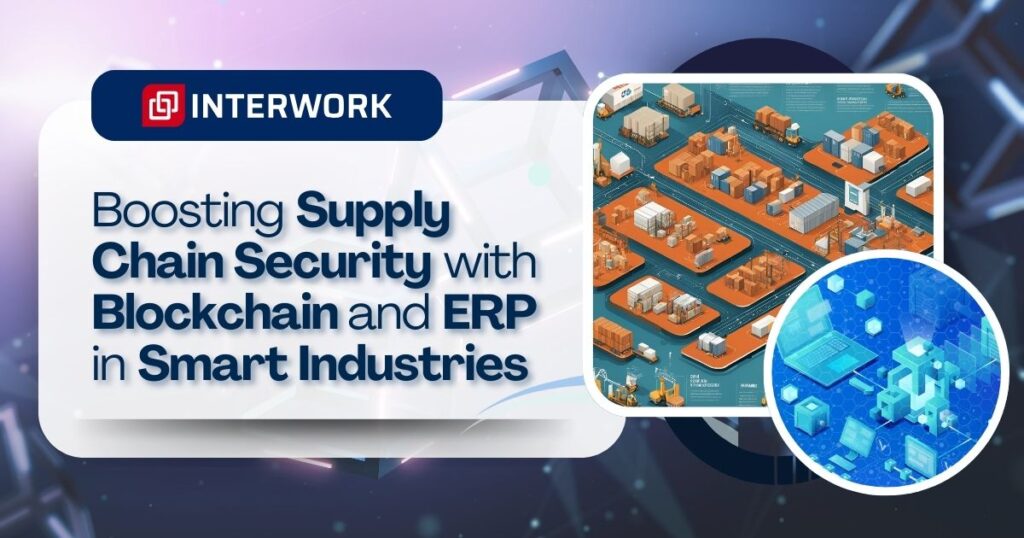
Supply chain security is a crucial factor than ever before in the fast developing context of Industry 4.0. When firms integrate new and improved systems, the importance of and accountability and trackability of data increases as well. Among proposed solutions, one of the most effective deals with the implementation of blockchain with the help of integration with ERP systems. This integration improves the security status of supply chain and provides transparency and reliability required in smart industries.
Understanding Blockchain and ERP Integration
Blockchain can be describe as a distributed database that records consensus of computer network. This guarantees that once you store data within the blockchain then nobody on the network can edit this data. Blockchain when used in tandem with ERP systems presents an optimize and secure process that supply chain information can be handle efficiently.
- Data Security: Blockchain promotes increased data security since no matter the changes made, the data stored in the block cannot be altered. Every transaction is a record that is encrypted and linked to another record which make it to be a series of secured information. This implies that key supply chain information including contracts and shipment information cannot be accessed by anyone or fraudulent entities.
- Traceability: Among many factors, one of the strongest aspects of blockchain is the capability for the end-to-end tracking. Particularly for a modern and rather complicated supply chain, identification of origins and flows of material products is critical. Their usage of products offer an opportunity to chart various actions such as sourcing of raw materials, preparation, and delivery through blockchain. This makes it easy to produce an audit trail of products, so that the companies can ascertain their validity as well as compliance with the law.
Enhancing Transparency in Smart Industries
Smart industries are highly dependent on networking and on sharing information. Blockchain makes this possible because all the records in the supply chain are well share within the involve parties. This transparency minimizes conflict and strengthens interaction between suppliers, manufacturers and retailers.
- Real-Time Data Sharing: When using blockchain, data is share in real time across all stakeholders. When combined with ERP systems, this is achieve seamlessly. This ensures that every party in the supply chain has the latest information on any aspect of the process. As a result, responses and decision-making can be carry out effectively. For example, disruptions like a change in the supply chain can be resolve quickly since all stakeholders are immediately aware.
- Improved Accountability: Since operations records on the blockchain cannot be altere, every participant in the supply chain takes responsibility for any action. This it will promote ethical conducts and distinct the possibility of fraud or malpractice. Firms can rely more on their partners, as the provided data is credible.
Challenges and Considerations
However, there are some barriers to bear in mind when adopting blockchain with ERP systems making the benefits worthy to achieve. To fully adopt this technology, appears to need a change of culture or etiquette as well as possible change of systems. Therefore, organisations require adequate budgets to make transitional improvisations and train their existing human capital effectively. Moreover, not all suppliers are willing to implement blockchain technology in their supply chain, which leads to gaps in this chain.
How Interwork Software Solutions Can Help
At Interwork Software Solutions, we help businesses navigate Industry 4.0. We provide tailored solutions that integrate advanced technologies like blockchain and ERP systems. Our expertise in supply chain management allows us to streamline operations, enhance security, and improve transparency.
- Seamless Blockchain-ERP Integration: We know that implementing blockchain with ERP systems can be daunting. Our experts ensure smooth and efficient integration, allowing your organization to quickly leverage the benefits of both technologies. From tracking raw materials to auditing product flows, we help you create a fully optimized and secure supply chain network.
- Data Security and Compliance: Interwork Software Solutions ensures that your supply chain data is protected with top-tier security measures. Our blockchain-based solutions make it impossible for unauthorize changes to be made to your sensitive data. This guarantees compliance with industry regulations and builds trust with your partners and customers.
- Real-Time Data Access for Better Decision-Making: We help you set up systems that provide real-time visibility into your supply chain. With blockchain-ERP integration, you can share accurate, up-to-date information with all stakeholders, ensuring quick and informed decision-making, even during disruptions.
- Customized Solutions for Your Business: No two supply chains are the same. At Interwork Software Solutions, we take the time to understand your specific needs and tailor our services to your goals. Whether you’re looking to enhance traceability, improve accountability, or streamline operations, we design solutions that fit your unique requirements.
- Training and Support: Transitioning to blockchain and ERP systems requires proper training and support. We provide end-to-end guidance, from system implementation to employee training, ensuring that your team is fully equipped to handle the new technology. Our ongoing support guarantees a smooth adoption process, with minimal disruptions to your operations.
Conclusion
The adoption of blockchain is on the rise within industries as a means of enhancing supply chain security as industries pursue the digital transformation agenda: the blending of blockchain with ERP systems is particularly noteworthy. This complements each other, thus improving the security of data and records to enable smart industries to open their operations to the public. Ensuring cooperation and effectiveness, corporations will develop strong and effective supply networks for the future. This technology cannot be a matter of choice, it rather becomes a need to meet customers’ demands in the ever-competing market.
